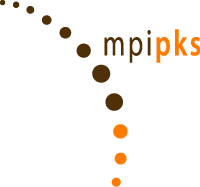
Openness as a resource: Accessing new quantum states with dissipation
Workshop Report
The meeting was organized as a part of the advanced study group "Open Quantum Systems far from equilibrium" (2019-2022).
The focus of the workshop has been chosen on the challenge to what extent the openness of a quantum system can impact the underlying dynamics in providing novel mechanisms and unforeseen phenomena for which a coupling of the considered quantum system to environments acts as a primary input; i.e., then evolving away from an unitary time-evolution, -- in distinct contrast from its isolated dynamics. This being the case, openness presents not a nuisance but rather can be used as a resource: For example, non-unitary mechanisms such as dissipation and/or dephasing can be employed to fight decoherence in stabilizing new quantum states. Alike, those can be utilized to convert heat stemming from a coupling to environment(s) into useful work in quantum devices, allowing for the operation of thermal quantum machines, or also for the generation of stylized classes of new quantum states.
Despite the intricacies we faced with the still ongoing Covid-19 situation the meeting was planned from the very beginning as a hybrid format, but with all speakers taking part in the workshop strictly *on-site*, as well as all selected poster presenters. Consequently, the total number of on-site participants has been limited to no more than 30. This restriction together with the requirement of a full vaccination status (2G) in essence limited that the majority of those on-site participants were arriving from within Europe only. Altogether, a total of 130 participants took part at the meeting, including a total of 29 external on-site ones plus a total of registered 101 virtual participants. All those could discuss, however, with the speaker(s) for both, those either attending on-site or in case for virtual participants via zoom during the respective on-site presentation and naturally also during the 10-15 minutes discussion round, which followed each presentation. The invited speakers included full professors, primary and senior post-docs, as well as selected PhD students actively engaged in the subject matter.
The agenda of the workshop was divided over a period of 4 days via selecting 4 main topics for each day: We started out with the the theme of periodically driven open systems -- which culminated in an illuminating overview with the colloquium presented by Prof. A. Eckardt (TU Berlin). The next topic centered on nonequilibrium steady states of various open many-body systems. This was followed with presentations of many-body localization physics (in theory and experiment) and the challenging topic of characterizing "Dissipative Quantum Chaos". The forth day was earmarked for quantum thermodynamics of general and specific open quantum systems, including a description for, -- in parts still controversially discussed --, notions such as quantum work, heat and feedback-control in regimes from weak-to-strong system bath couplings. Somewhat off the main conference topic, a particular inspiring talk was presented by M. Haque who addressed the challenge of assigning a "temperature" to eigenstates of individual many-body states, via addressing all the pros and cons which this problem comprises.
In discussing with all participants we uniformly received praise for our chosen format: Particularly, our ample time provided for discussions between the oral presentations and during the poster session was highly appreciated. In several cases this initiated future ideas and in cases even instigated joint future collaborations among the participants. Particularly worthy was also the fact that the young invited speakers at their advanced PhD-level and primary postdoc-level presented most impressive talks that were rich in content and results.
Last but not least, the organizers like to thank the Institute staff, and in particular Mandy Lochar, for providing their dedicated and outstanding organizational support. The possibility to organize this very workshop in the hybrid format has greatly contributed to its success. We are very thankful to Ronny Börner for his invaluable support on the IT-side during the whole meeting. Likewise we thank the kitchen staff which provided very good tasting meals throughout all days of the meeting.
Sergiy Denisov, Michele Campisi and Peter Hänggi
